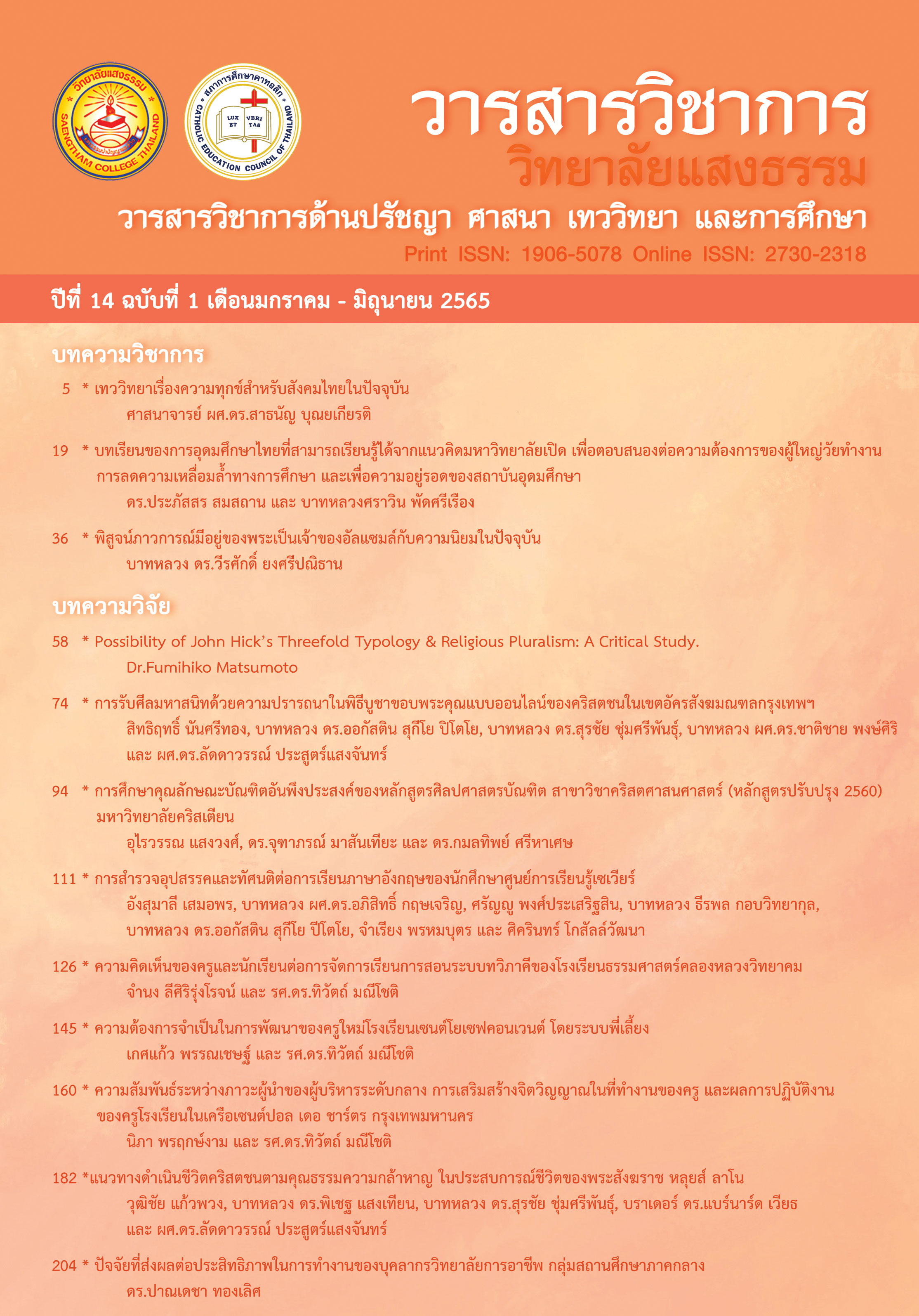The Relationships Among Leadership of Middle Administrators, Workplace Spirituality Reinforcement and Job Performance of Teachers in Saint Paul of Chartres’ Schools In Bangkok.
Main Article Content
Abstract
This research aims to study 1) the level of leadership of middle administrators. 2) the level of workplace spirituality reinforcement of teachers. 3) the level of the job performance of teachers and 4) the correlation among the leadership of middle administrators, workplace spirituality reinforcement, and job performance of teachers of Saint Paul of Chartres’ Schools in Bangkok. The samples used in this research were 316 teachers, who were not middle level administrators, in five Schools of Saint Paul of Chartres in Bangkok, The academic year 2019. The tools used in this research were a self-assessment scale consisting of questionnaire about the leadership of middle administrators, a workplace spirituality reinforcement test, and a job performance test. The statistics used for data analysis consist of mean, standard deviation, and Pearson's Correlation Coefficient. The results of the research revealed that: 1) The overall level of leadership of middle administrators and in each aspect were at the highest level. The aspect with the highest average was the open-mindedness, and the aspect with the lowest mean was the attention and good wishes for others. 2) The overall level of workplace spirituality reinforcement of teachers was at the highest level. As for each aspect, it was in the highest level almost in all aspects. The highest mean was the consciousness of the strong goal and the aspect with the lowest mean was the tolerance of teachers' expression. 3) The overall and each aspect of the job performance of teachers was at the highest level. The highest mean was the operations such as image and professional ethics of teachers, and the lowest aspect was learning management. 4) The leadership of middle administrators positively correlated with the workplace spirituality reinforcement of teachers, both in the overall and each aspect. It was also correlated positively with the teachers' performance, both in the overall and in each aspect. There was a high level of positive relationship between workplace spirituality reinforcement and job performance of teachers, with a statistical significance of .01 level.
Article Details

This work is licensed under a Creative Commons Attribution-NonCommercial-NoDerivatives 4.0 International License.
- The academic and research articles, as well as the content and opinions expressed therein, published in Saengtham College Journal are solely the responsibility of the respective author(s).
- Articles published in Saengtham College Journal are the property of Saengtham College. Reproduction, modification, or dissemination of all or part of the content in any form without written permission from Saengtham College is prohibited.
- Articles published in Saengtham College Journal are protected under the Copyright Act.
References
กุลนันท์ เลี้ยงสุขสันต์. (2553). ปัจจัยส่วนบุคคล ภาวะผู้นํา ทัศนคติต่อธรรมาภิบาลที่ส่งผลต่อธรรมภิบาลของผู้ประกอบการวิสาหกิจขนาดกลางและขนาดย่อม [วิทยานิพนธ์วิทยาศาสตรมหาบัณฑิต]. มหาวิทยาลัยเกษตรศาสตร์.
ชาครียา ศรีทอง. (2547). ความสัมพันธ์ระหว่างภาวะผู้นํา บุคลิกภาพ ทัศนคติต่องานบริการกับผลการปฏิบัติงานของผู้บริหารระดับกลางของธนาคาร [วิทยานิพนธ์ วิทยาศาสตรมหาบัณฑิต]. มหาวิทยาลัยเกษตรศาสตร์.
นภดล ร่มโพธิ์ และ มนวิกา ผดุงสิทธิ์. (2552). เครื่องมือการประเมินผลการปฏิบัติงานองค์กร. ศูนย์หนังสือมหาวิทยาลัยธรรมศาสตร์.
ปวริศา เนียรภาค. (2551). ภาวะผู้นํา บุคลิกภาพ การเห็นคุณค่าแห่งตน ความสามารถในการตัดสินใจกับผลการปฏิบัติงานของหัวหน้าพนักงานต้อนรับบนเครื่องบิน บริษัท การบินไทย (มหาชน) จํากัด [วิทยานิพนธ์ วิทยาศาสตรมหาบัณฑิต]. มหาวิทยาลัยเกษตรศาสตร์.
ภารดี อนันต์นาวี. (2548). การวิเคราะห์เส้นทางปัจจัยภาวะผู้นําและบรรยากาศองค์การที่ส่งผลต่อการบริหารจัดการที่ดีของสํานักงานเขตพื้นที่การศึกษาภาคตะวันออก. มหาวิทยาลัยบูรพา).
รัตติกรณ์ จงวิศาล. (2548). การพัฒนาภาวะผู้นําของผู้ประกอบการวิสาหกิจขนาดกลางและขนาดย่อมไทย. มหาวิทยาลัยเกษตรศาสตร์.
รัตติกรณ์ จงวิศาล. (2556). ภาวะผู้นำ. ศูนย์หนังสือจุฬาลงกรณ์มหาวิทยาลัย.
รัตติกรณ์ จงวิศาล. (2561). จิตวิทยาองค์การ. ศูนย์หนังสือจุฬาลงกรณ์มหาวิทยาลัย.
สุธรรม อัศวศักดิ์สกุล. (2549). ความสัมพันธ์ระหว่างแรงจูงใจ ภาวะผู้นํา บรรยากาศองค์การและผลการปฏิบัติงานของผู้จัดการ [วิทยานิพนธ์ วิทยาศาสตรมหาบัณฑิต]. มหาวิทยาลัยเกษตรศาสตร์.
วิภาดา คุปตานนท์. (2551). การจัดการและพฤติกรรมองค์การ: เทคนิคการจัดการสมัยใหม่. ศูนย์หนังสือมหาวิทยาลัยรังสิต.
Abdullah A.K.; Alzaidiyeen N.J. and Aldarabah I.T. (2009). “Workplace Spirituality and Leadership Effectiveness Among Educational Managers in Malaysia”. European Journal of Social Sciences. 10(2), 304-316
Beauregard, T. A. and L. C. Henry. (2009). “Making the link between work-life balance practices and organization performance”. Human Management Review. 19,9-22.
Daft, R.L. (2008). The Leadership Experience [4th ed.]. Harcourt, Inc.
Dubrin, A. J. (2010). Principles of Leadership. Cengage Learning.
George, M.J. (2000). “Emotional and Leadership: The role of emotional. n.p.
Jung, D.I., B.M. Bass, & J.J. Sosik. (1995). “Bridging leadership and culture: Atheoretical consideration of transformational leadership and collectivistic cultures.” Journal of Leadership Studies. 2(4), 3-18.
Karakas, F. (2010). “Spirituality and Performance in Organizations: A Literature Review”. Journal of Business Ethics. 94, 89-106.
Lane, B.N. (2005). Understanding Anticipatory Grief: Relationship to Coping Style, Attachment Style, Caregiver Strain, Gender Role Identification, and Spirituality [Doctor of Philosophy Thesis in Counseling Psychology]. Texas A&M University.
Lussier, R. N. and C. F. Achua. (2007). Effective Leadership (3 ed). Thomson Learning.
Marques,J.,Dhiman,S. and King,R. (2007). “Spirituality in the Workplace: What It Is, Why It Matters, How to Make It Work For you”. Personhood Press.
Robbins, S.P. and Judge, T.A. (2017). Organizational Behavior (12th ed). Pearson Education.
Robbins, S.P. and Judge, T.A. (2009). Organizational Behavior (13th ed). Pearson Education.
Schermerhorn, J.R. (2002). Management (7th ed). John Wiley & Sons, Inc.
Yukl, G. (2006). Leadership in Organizations (6 ed). Prentic Hall. Inc.


